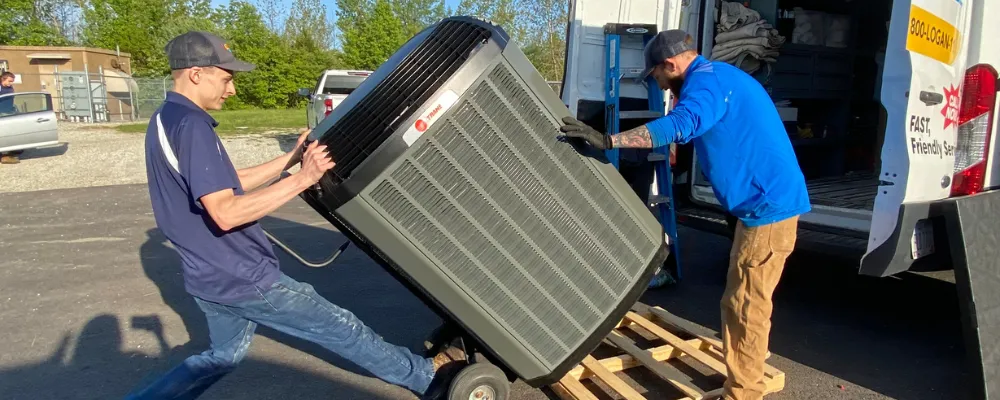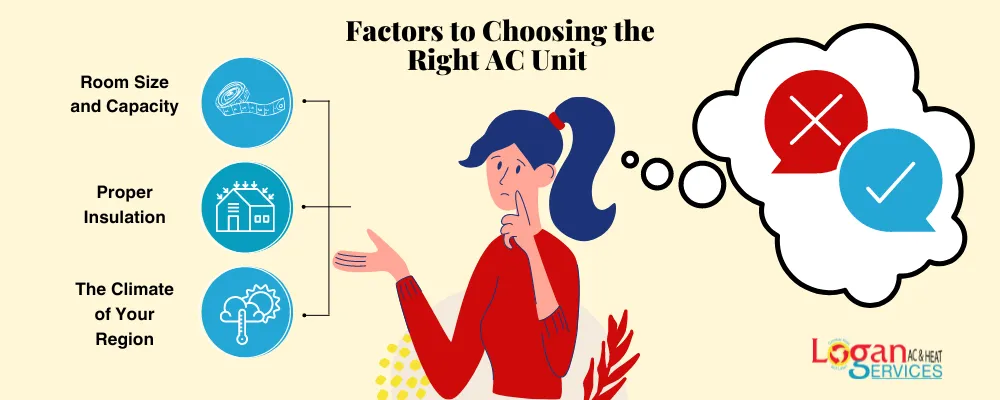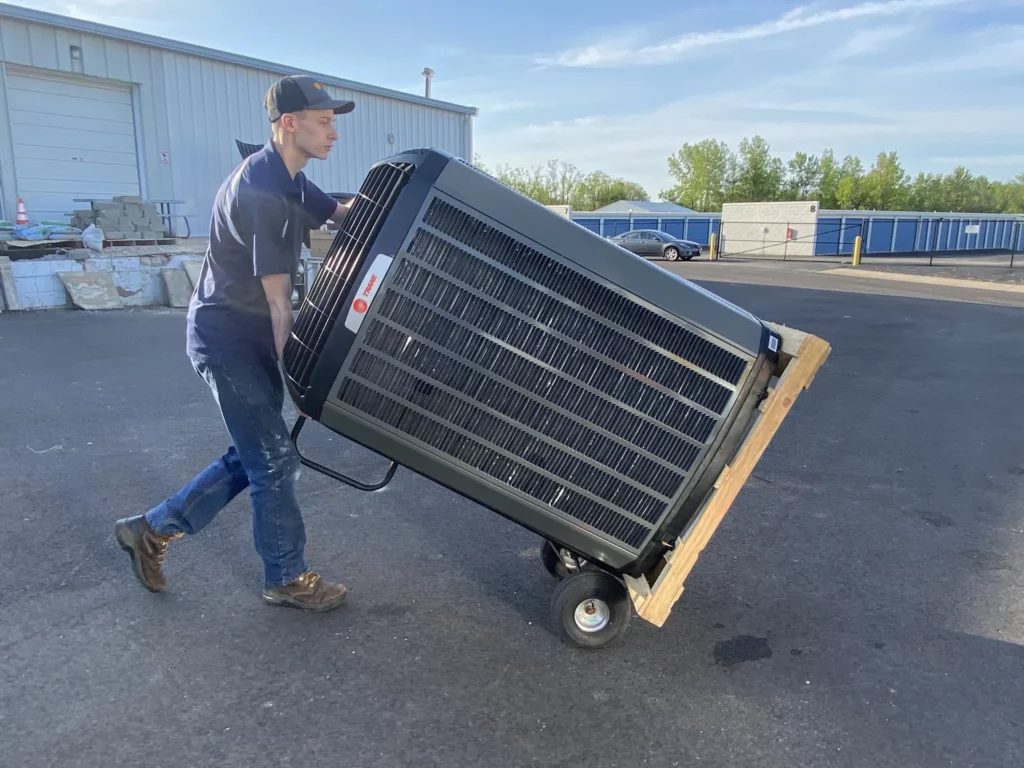Air conditioning units are essential to keep our homes and workplaces comfortable, especially during the summer months.
However, your AC’s performance and lifespan depend on correctly installing the unit, regular maintenance, and safe handling of the refrigerants.
In this blog, we will give you a comprehensive overview of air conditioning installation. From the importance of proper installation to the critical steps in the installation process, we cover what key factors you should consider before and after installation and the potential challenges you may encounter.
The Importance of Proper AC Installation
Regardless of your AC unit’s quality, proper installation is critical in ensuring that your investment pays off for efficiency and longevity. Let’s review why proper installation is critical for getting the most out of your air conditioner.

Ensuring Peak Performance
A correctly installed air conditioning unit will operate at its maximum potential, providing the cooling efficiency you expect from such a system. Proper installation ensures the unit works seamlessly with your home’s air distribution system, which entails adequate airflow to each room and maintaining the desired temperature.
A poorly installed system can lead to an inefficient cooling process and wasted energy, translating into higher electricity bills. So, to maximize the value of your AC unit and save on energy costs, ensure you work with professional and experienced technicians during the installation process.
Prolonging the Lifespan of the Unit
A properly installed AC unit can last for years without any significant performance loss. On the other hand, improper installation can lead to malfunctioning components, which may require costly and time-consuming repairs down the line. Additionally, an incorrectly installed unit may cause undue stress on the system’s components, shortening their life and negatively affecting the overall performance of your AC. By investing in proper installation, you can ensure your air conditioning system will serve you well for a long time, creating a comfortable living environment free from the hassles of frequent repairs or replacements.
Avoiding Unnecessary Repair Costs
Improper installation of an air conditioning unit can lead to many issues that may result in needing costly repairs. For example, incorrect wiring or poorly sealed ductwork can cause system inefficiencies, inconsistent cooling, and higher energy bills. Moreover, inappropriate mounting or leveling of the unit may lead to drainage problems and water leaks, which can further damage your home.
To avoid these unnecessary expenses, it’s crucial to invest in qualified professionals for the installation process, ensuring that your AC is installed correctly from the beginning.
Factors to Consider Before AC Installation
Before you invest in a new AC unit, here are some factors to keep in mind.

Room Size and Capacity
Before installing an air conditioning unit, think about the space you want to cool. Measuring the desired area will help to determine the right capacity of the unit needed to maintain a comfortable temperature. If the unit is too small, it won’t cool the space efficiently. However, if your air conditioner is too big, it will consume too much energy, resulting in high electricity bills. A certified AC professional will calculate the necessary unit size suited to the room or area you want to keep cool.
Proper Insulation
Good insulation is crucial in ensuring your air conditioning unit’s long-term efficiency. Ideally, your home should have appropriate insulation in walls, ceilings, doors, and windows so that it can maintain a comfortable temperature by minimizing the amount of heat that enters and exits the house.
Before installing an AC unit, assess the state of your home’s insulation and consider necessary improvements. Consult with a professional contractor to determine how to cost-effectively improve your insulation before or after central ac unit installation and ensure a more energy-efficient cooling system.
The Climate of Your Region
The climate of your region plays a critical role in determining the ideal type of air conditioning system for your home. If you reside somewhere with hot and humid summers, a central air conditioning system may be the most efficient option. However, for locations with milder summers, a window or portable AC unit may suffice. An experienced HVAC professional will assess your region’s climate and recommend an appropriate air conditioning system tailored to your needs.
In conclusion, proper AC installation is crucial to ensure peak performance, prolong the lifespan of the unit, and avoid unnecessary repair costs. Before installing an AC, consider factors such as room size and capacity, proper insulation, and the climate of your region. By taking these factors into account and partnering with skilled professionals for the installation, you’re well on your way to enjoying a cool and comfortable home for years to come.
Steps for A Successful AC Installation Process
Now that you know what to keep in mind when choosing an air conditioning system, it’s time to review the steps for a successful installation.
Choosing the Right Type of AC System
Before diving into the installation process, it’s vital to take the time to find the proper AC unit that will suit your space. There are several common AC systems to choose from, including central air, ductless mini-splits, window units, and portable units. Each system has its benefits and disadvantages, depending on factors such as your budget, space constraints, and cooling needs.
Central air conditioning systems provide whole-house cooling and are typically cost-effective for larger homes or buildings. Ductless mini-splits offer a more efficient and flexible solution for smaller spaces or homes without existing ductwork. If you’re on a tighter budget or need a temporary solution, window units or portable AC systems might be the ideal choice.
When choosing a system, it’s crucial to consider factors such as energy efficiency, noise levels, and available space. Consult a professional HVAC installer so you can make the right choice for your space.
Hiring a Professional Installer
Once you’ve chosen the right type of AC system, the next step is to hire a professional installer. While many homeowners might be tempted to attempt a DIY installation, it’s essential to understand that air conditioning systems can be complex and require expert knowledge to install them correctly.
An experienced HVAC technician will ensure your new air conditioning system is installed safely and operates efficiently. They’ll also be familiar with local building codes and regulations, helping you avoid potential issues down the road. Moreover, hiring a professional installer gives you the peace of mind that your AC system is protected by a warranty if you encounter issues later on.

To find the right HVAC team, look for companies in your area. You can also consult friends and family or review websites. Contact potential contractors and ask for references, as well as proof of their licensing and insurance. By taking the time to hire a reliable professional, like Logan Services, you’ll be one step closer to a successful AC installation.
Ongoing Maintenance and Care
After your AC system is installed, it’s essential to invest in ongoing maintenance and care to keep it running at peak performance. Professional HVAC technicians recommend scheduling a tune-up at least once yearly, preferably before the cooling season begins. During a tune-up, the technician will inspect, clean, and test your AC system to ensure it’s functioning correctly and efficiently.
In addition to professional maintenance, home and business owners should regularly check and clean or replace their AC system’s air filters. Dirty filters can significantly decrease your air conditioner’s efficiency and even cause damage to your system. Additionally, ensure your outdoor unit is free from debris and obstructions to maintain proper airflow.

By investing in ongoing maintenance and care, you’ll extend the life of your AC system, save on energy costs, and avoid costly repairs or replacements.
Potential Challenges in AC Installation
While a professional installer can help you navigate many challenges during the AC installation process, it’s essential to be aware of potential issues that may arise. Here, we’ll take a look at some challenges and provide expert tips on handling them effectively.
Handling Refrigerants Safely
Refrigerants are one of the most critical components of an air conditioning system. However, they can also be hazardous if not handled correctly, posing a risk to your health and the environment. Expert AC installers are familiar with proper refrigerant handling techniques and are trained to adhere to Environmental Protection Agency (EPA) regulations.
If you’re working with a professional installer, rest assured that they should be taking the necessary precautions to ensure safe refrigerant handling. Additionally, if you ever need to add, remove, or replace refrigerant in your AC system, always contact a professional HVAC technician instead of attempting it on your own.
Installing Accurate and Efficient Ductwork
Central air conditioning systems use ductwork to deliver cool air throughout your home or building. Improperly installed or designed ductwork can lead to inefficiency, increased energy costs, and uneven temperatures. A professional installer will ensure your ductwork is adequately sized and installed for maximum efficiency.
If you’re installing a ductless system, it’s still essential to consider the placement and installation of any necessary components, such as the outdoor unit, indoor air handlers, and refrigerant lines. A professional installer can help you determine the best configuration for your specific needs.
Ensuring Adequate Clearance Around the Unit
The location and clearance around your air conditioning unit are crucial to a successful installation. For outdoor units, sufficient clearance around the unit ensures proper airflow and prevents potential damage from debris or vegetation. Indoor units, such as window or through-the-wall air conditioners, also require adequate space for optimal performance.
A professional installer can help you choose the best location for your AC system, considering factors like available space, shade, and proximity to doors and windows. By ensuring your unit has proper clearance and is correctly installed, you’ll enjoy a more efficient and successful AC installation.
About Logan Services A/C, Heat & Plumbing
Since 1969, Logan Services A/C, Heat & Plumbing has served Ohio residents with outstanding HVAC work. From AC installation to heating system repairs, our trusted professional team can ensure a seamless job from start to finish.
If you are looking to install a new AC unit, we can help. When you go with professionals for your installation, you can trust you’ll get maximum outfit and efficiency from the beginning. Our team offers a variety of options to help relieve the stress of paying for a new air conditioner. When you request A/C installation in Ohio, we are happy to provide a free estimate on replacement.
Don’t forget to ask about our financing options, which make it easier to pay off the cost of the unit and installation over time. Our professional installation services will put you at ease with the assurance that you are getting the most from your investment. Contact us today to get started.
FAQs AC Installation
How much does it cost to install an air conditioning system?
The cost to install an air conditioning system varies depending on factors like the size, brand, and type of system. In addition, factors like the complexity of the installation and your geographic location can influence the final installation cost.
What type of AC system should I choose for my home?
There are several types of AC systems to choose from, including central air systems, ductless mini-split systems, and window units. The best system for your home depends on factors like your home’s size, your budget, and your cooling needs. Consulting with an AC installation expert can help you determine the right fit for your home and budget.
How do I know what size air conditioner to get?
The size of the air conditioner needed depends on multiple factors, including the square footage of your home. Typically, an air conditioner’s cooling capacity is measured in British Thermal Units (BTUs). A professional HVAC technician can help you calculate the appropriate size of air conditioner for your home, ensuring optimal performance and energy efficiency.
How long does it take to install an AC system?
The time it takes to install an AC system depends on factors like the type and complexity of the system. Generally, a central air system can take one to three days to install, while a ductless mini-split system may take one to two days. When partnering with a highly experienced HVAC company like Logan Services, you can expect most system installations to finish in just one day. A window unit can be installed in just a few hours. A professional HVAC technician can provide a more accurate time frame based on your specific situation.





















